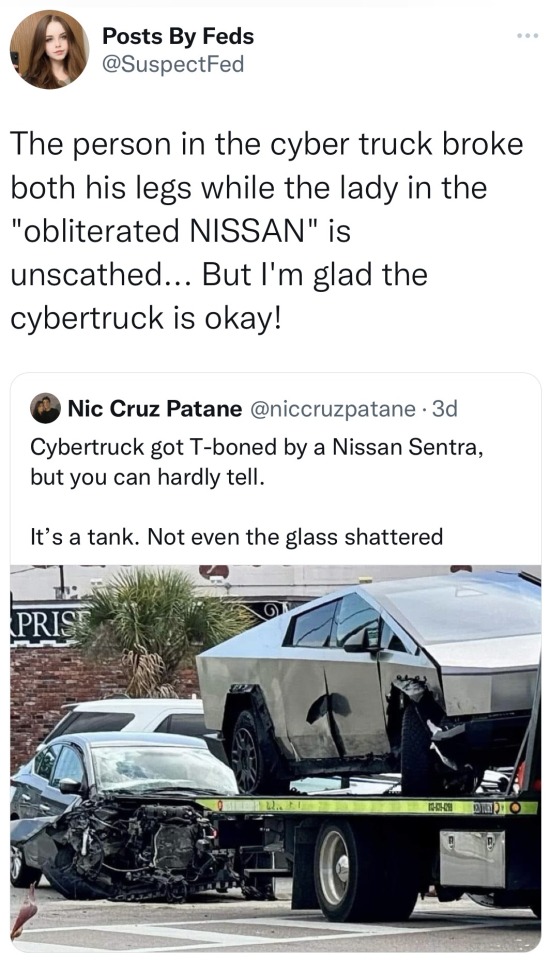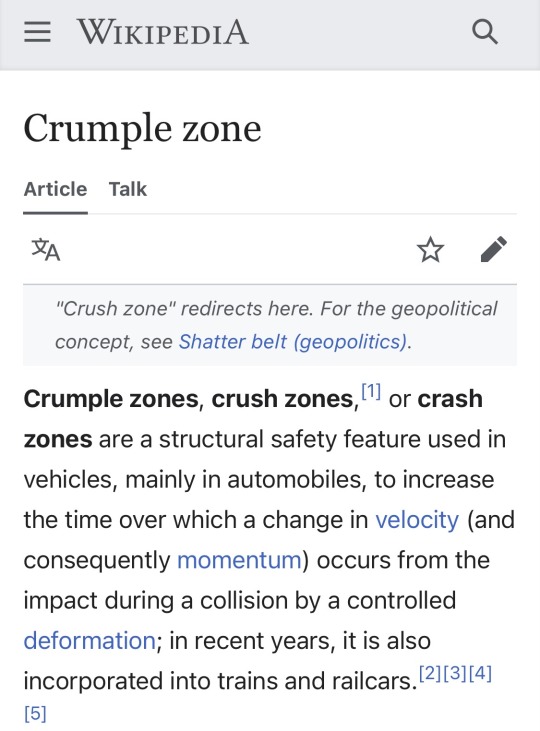Text
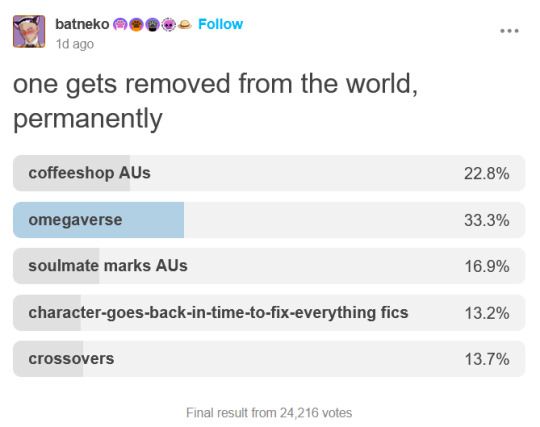
truly we could not rid the world of any au, the fandom ecosystem must have balance, and so, as much as it pains me to admit, much like the humble mosquito, or the wasp i fucking guess, we have to keep soulmate aus
(but they should go on a high shelf until alloros learn how to behave)
(if you said omegaverse aus, grow up. stop being a baby. they're not for you, they are for the furries, the touch starved, and those with breeding kinks, and where would we be without them?)
3 notes
·
View notes
Text
If your regular everyday clothes* were put on a mannequin, and placed in a group of other mannequins that are dressed in regular street clothes of your region, could the people who know you spot the mannequin who is "you" from clothes alone?
*if you are of an unusual size or build, assume for the sake of this thought experiment that they've found clothing items that are otherwise identical to yours, but able to fit to a standard mannequin
5K notes
·
View notes
Text

Whatever the case, feel free to write long-winded explanations in the tags, I WILL read them!
3K notes
·
View notes
Text
One of the people I worked with at the sex shop was a lady in her early forties. She had the most deranged sex stories and to be honest I could never tell how much was real.
I think probably all of it was true? But when someone tells you that a man showed up at her door with a sheet cake he wanted her to sit on so he could eat it off her ass it’s fair to be somewhat skeptical.
Aaaanyway. She hooked up a lot and ended up on a casual date with this guy. She was really stoked to be wearing a button up shirt with snaps, so later when they got to his place she could rip the shirt open like in the movies.
Now, it's worth noting she was a bigger gal, and her cleavage could have suffocated a grown man, it was substantial. There was a lot of boob real estate, okay?
So they get back to his place, and she finally gets to have her moment. She rips her shirt open dramatically, displaying the wealth of her cleavage. At first her dates face was excited and delighted. But as his eyes trailed down he began to slowly frown, which I think we can all agree is not what anyone wants when you've just laid yourself bare in a literal fashion.
She looked down to check herself, and there, nestled like a little baby bird in a nest of boob, was a single dorito.
When she told me this story she admitted, "I knew I had a choice. I could get laid, or I could eat the chip."
She ate the chip.
Her date looked repulsed, but she wanted to take one last crack at riding that man, so she did jazz hands and sang in a silly vaudevillian accent, "🎶You should probably put yer meat in me! You should probably put yer meat in me!🎶"
He drove her home shortly afterward, the coward.
4K notes
·
View notes
Text

Day 2 (Traveling to Middle Earth | The Helcaraxë | Bonds Broken, Bonds Made) for @glorfindelweek !!
This is so so headcanon heavy but tl;dr I like to headcanon a) Idril as the equivalent of 10-12ish at the start of the Helcaraxë and Glorfindel being only a little older than her, b) Glorfindel as Idril's first cousin, on her mother's side, and c) them being more or less friendly before the Helcaraxë but growing very very close during the march!
They're just two kids watching out for each other when the adults are busy with important adult things
35 notes
·
View notes
Text
walks up to a gay couple: so which one of you gets shot and which one of you gets splattered in their blood?
290 notes
·
View notes
Text
Seal the Deal





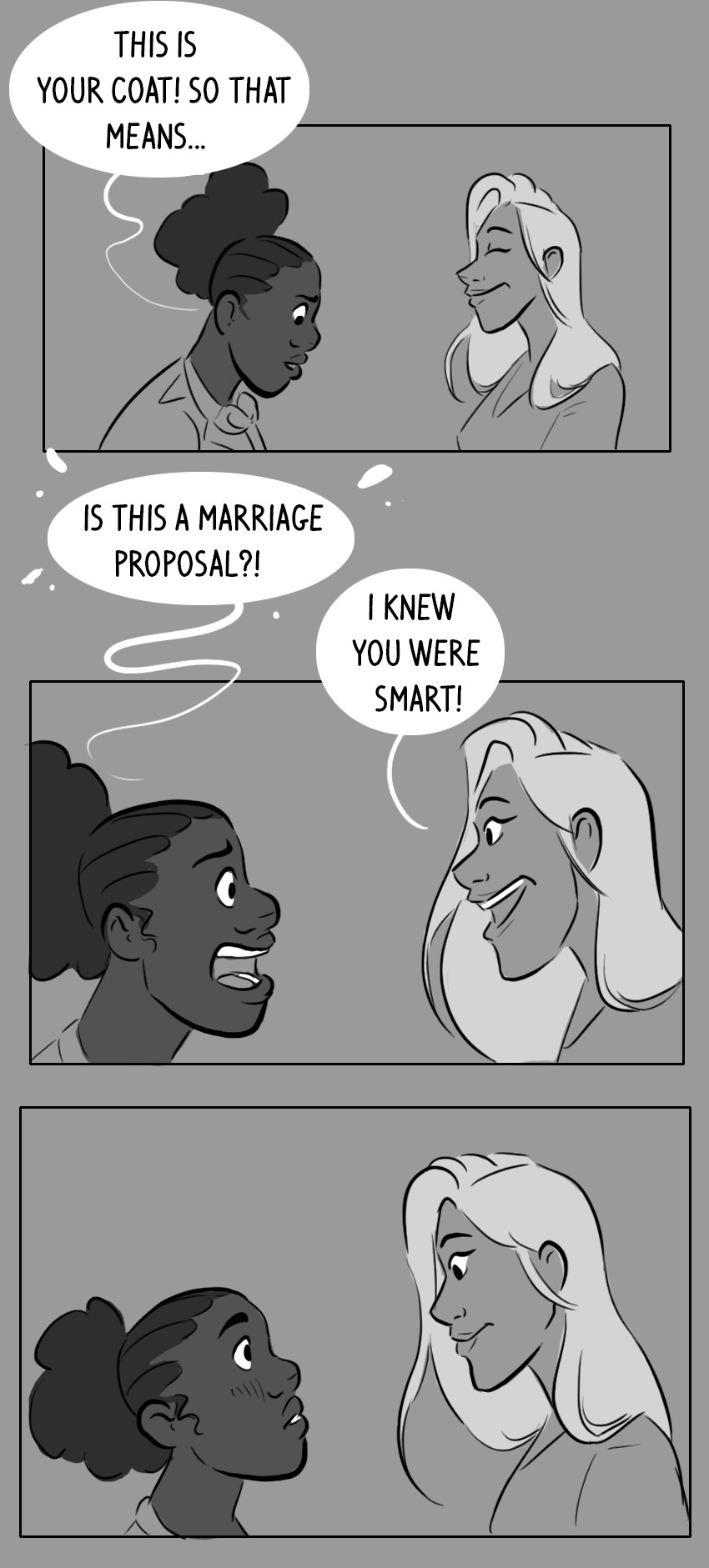



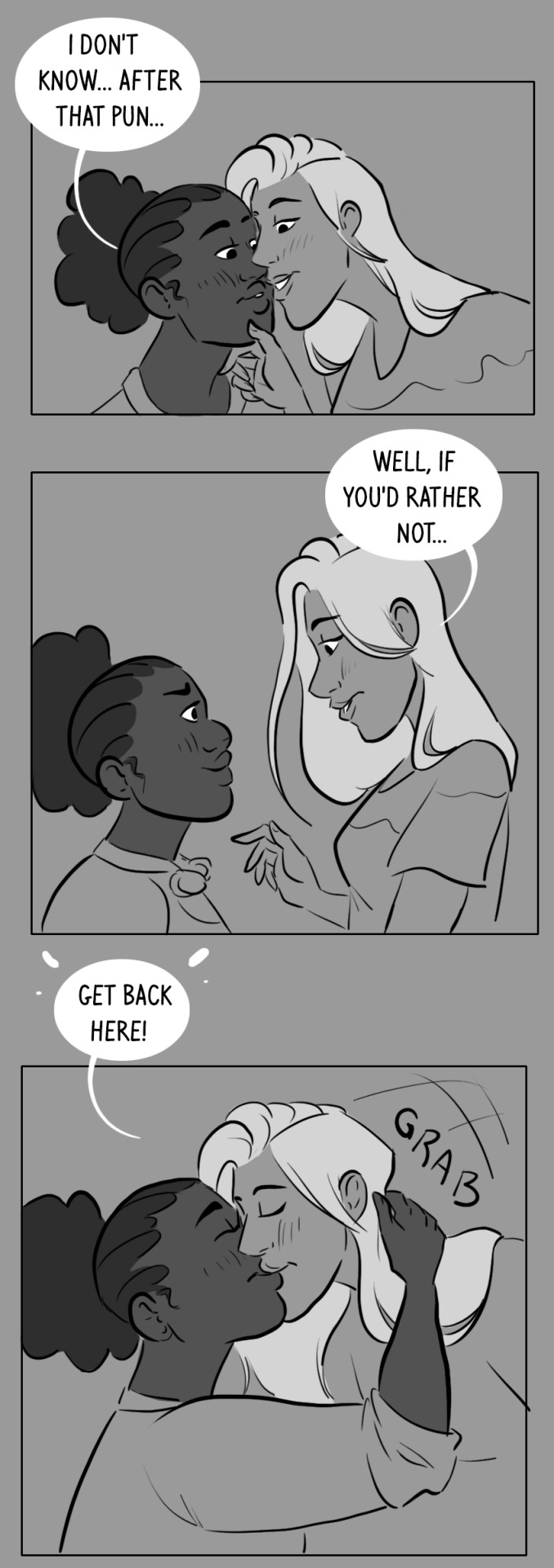
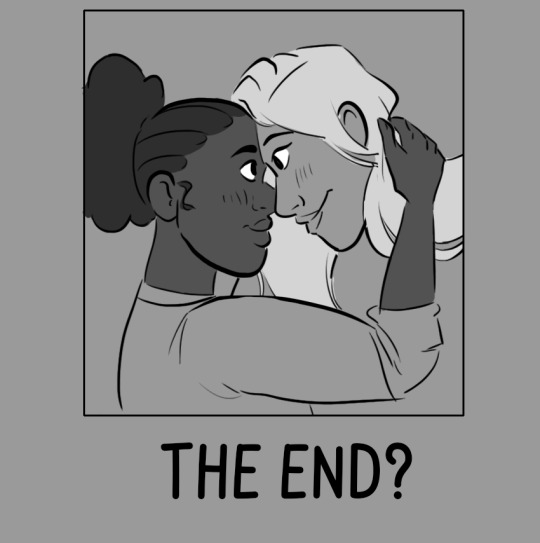

Here's my latest comic, Seal the Deal! Based on this post.
If Kleo and Aisling sparked joy I could be convinced to make more parts if they get enough love, I have a lot of little adventures as they navigate being suddenly married bopping around in my head.
Tips welcome on my Kofi!
Here's more comics!
11K notes
·
View notes
Text
We don’t bully Sauron enough for being such a FUCKING instagram villain that he’d only ever steal black horses from the Rohirrim, like he really in canon passed over herds of perfectly good load-bearing horses just for aesthetic fidelity
8K notes
·
View notes
Note
Do you have any tips (or previous posts) about how to write a young person who’s first-time cane user? This one is for a character who escapes a lifetime of being experimented on, and learns in the aftermath of being rescued that this rather compromised her ability to walk well again. I’ve written characters with other mobility devices for getting around. But never canes. I myself am physically disabled but have never needed anything like these before. I’m always eager to learn.
Hi!
If your character is a first time cane user, here's some things that could happen:
She will need to learn how to walk with the cane first. When you're starting, it's easy to mess up (though it could be my dyspraxia speaking) and overfocus on how you should walk because you're just getting used to it. She could randomly stop and correct her gait, or look down a lot to check if she's still doing the motion (left arm and right leg forward, or the other way around).
She's probably gonna drop that thing a lot. Especially if she has a weaker grip in the cane hand - now, I don't have this problem (the opposite, rather) - but the overall thing is a really common occurrence for most of us. Walking and hit the smallest pebble imaginable? Cane on the ground, somehow. Tried putting it against the wall or table? It's on the ground. And then you need to reach for it... it's a struggle sometimes.
If she's not helped in picking the cane, she will spend some time figuring out what grip and height are comfortable for her. (Grip depends on personal preference, no one's preference has ever been the doorknob handle, height is generally to the person's wrist from the ground up.) I think that this could be an interesting opportunity to talk about disabled communities - maybe she's frustrated with the process and goes to an older (more experienced) cane user to help her?
If it's during the winter, her hand is gonna be freezing - and the opposite in the summer - and she might not be prepared for it. The handle can get HOT and it can be an issue. Depending on what her actual disability is, she might try switching which hand to hold it in. If she's able to do that, another character could warm up her cold hand :)
The first couple of times walking with a cane are an Experience. You feel way better, but also everyone is suddenly staring. Some people care about that, some don't. But it can be somewhat overwhelming either way.
Spatial awareness is gonna suck at first. She will bump into what feels like everything with the cane. Especially doorframes. It's always doorframes for some reason. Or mess up and have her cane slip down because she hasn't realized how close to the curb she was.
She will hit her shin. It will hurt.
She's probably going to be speedy with that thing! Getting a cane is like getting a speed boost. Without it, I have episodes where I'm extremely slow (my highest, extreme-pain speed would be slower than a person walking very casually) and with it, I'm faster than a lot of able-bodied people! It's fun and she would have fun with it.
She will not know what to do with the cane when she doesn't need it. For me, using backpacks always cause issues because I don't know how to hold it without dropping it, but I also need to swap hands, something gets stuck on the handle... it's a whole process that takes a comical amount of time at first. Same when going to the public bathroom, where are you putting it when you aren't using it...? It's a lot of trial and error and a lot of "eww, my cane just touched the dirtiest surface humanly imaginable".
In the real world, people are (overly) interested in young cane user's business and tend to stare a lot. Now, it doesn't have to be like this in your story, but it's often just an annoying part of life. Your character might feel awkward and feel like she needs to explain herself, but this goes away after some time. You just get desensitized after a while.
In the real world, people are sometimes interested and nice about it! For example, a lot of older people can be insecure about using a cane, exactly like younger people. I've heard stories about older people asking younger users where they got their cane from, how are they so confident with it, etc. Another opportunity for a disabled community moment!
I hope that my suggestions were helpful, it's been a while since I was a first-time cane user so I wrote down what I still remember, haha.
Mod Sasza
Hi!
I agree with Sasza on pretty much every point and wanted to add some things from my own experience.
It's really, really hard to hold both a cane and an umbrella at the same time. Sometimes I'll give up and get wet. Sometimes I'll give up and store the cane. She might do either of those, depending on what she hates more: being wet or walking without the cane. Or she could get a raincoat if that works for her.
Speaking of umbrellas, sometimes you need your umbrella and you need your cane and you also need a free hand. This Sucks. What I do for this sometimes (and maybe she or other people have better, smarter, more useful solutions than this) is shove my umbrella into my shirt or backpack strap or something, so the umbrella is Held Up by it. This is not very effective, and will not last long. But if I need to look up a map on my phone or adjust something on my clothes or get my keys, it can work. Sort of.
Just like mod Sasza said, people will take interest in your cane, younger and older alike. I've had people of all ages compliment my cane (it has flowers) as well as people of all ages tell me I'm too young to need a cane or ask what's wrong with me. An older woman once asked me where I got my cane as she had been wanting a 'pretty' one, and that was a nice moment.
She might develop a new awareness of mobility aid users. When you're new at using one and trying to figure it out, you're probably going to be frustrated, because it's a new skill like any other. But it might make her (like it made me) notice more people using canes. It's not that I never saw them before, but that they were more common than I ever thought, and I never would have noticed how common it was if I hadn't had to slow down and practice my skill.
Cane tips get dirty, and cane tips wear out. These both depend on where your character is using her cane (outdoors vs indoors, scratchy asphalt vs smooth wood) as well as how often. A cane with a worn-out rubber tip really sucks and is more unstable and if the cane is made of aluminum and the tip is worn out and you hit the cane the wrong way, you can damage the cane. Ask me how I know.
That's all I can think of right now that I had to learn to deal with when I started! As you can see I still don't have a solution to the rain thing and it's been like two and a half years...
- mod Sparrow
180 notes
·
View notes
Text
Dealing with Healing and Disability in fantasy: Writing Disability
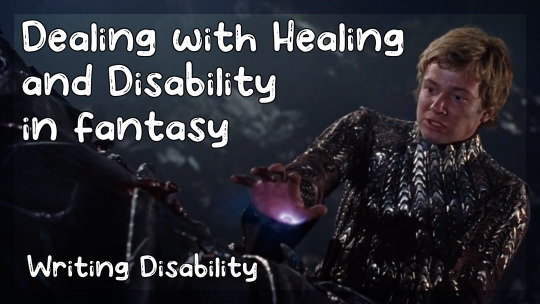
[ID: An image of the main character from Eragon, a white teenage boy with blond hair in silver armour as he sits, with his hand outstretched. On his hand is a glowing blue mark. He is visibly straining as he attempts to heal a large creature in front of him. /End ID]
I'm a massive fan of the fantasy genre, which is why it's so incredibly frustrating when I see so much resistance to adding disability representation to fantasy works. People's go-to reason for leaving us out is usually something to the effect of "But my setting has magic so disability wouldn't exist, it can just be healed!" so let's talk about magic, specifically healing magic, in these settings, and how you can use it without erasing disability from your story.
Ok, let's start with why you would even want to avoid erasing disability from a setting in the first place. I talked about this in a lot more detail in my post on The Miracle Cure. this line of thinking is another version of this trope, but applied to a whole setting (or at least, to the majority of people in the setting) instead of an individual, so it's going to run into the same issues I discussed there. To summarise the points that are relevant to this particular version of the trope though:
Not every disabled person wants or needs a cure - many of us see our disability as a part of our identity. Do difficulties come with being disabled? absolutely! It's literally part of the definition, but for some people in the disabled community, if you took our disabilities away, we would be entirely different people. While it is far from universal, there is a significant number of us who, if given a magical cure with no strings attached, would not take it. Saying no one in your setting would be disabled because these healing spells exists ignores this part of the community.
It messes with the stakes of your story - Just like how resurrecting characters or showing that this is something that is indeed possible in the setting can leave your audience feeling cheated or like they don't have to worry about a character *actually* ever dying. healing a character's disability, or establishing that disability doesn't exist in your setting because "magic" runs into the same problem. It will leave your readers or viewers feeling like they don't have to worry about your characters getting seriously hurt because it will only be temporary, which means your hero's actions carry significantly less risk, which in turn, lowers the stakes and tension if not handled very, very carefully.
It's an over-used trope - quite plainly and simply, this trope shows up a lot in the fantasy genre, to the point where I'd say it's just overused and kind of boring.
So with the "why should you avoid it" covered, let's look at how you can actually handle the topic.
Limited Access and Expensive Costs
One of the most common ways to deal with healing and disability in a fantasy setting, is to make the healing magic available, but inaccessible to most of the population. The most popular way to do that is by making the services of a magical healer capable of curing a disability really expensive to the point that most people just can't afford it. If this is the approach you're going to use, you also typically have to make that type of magic quite rare. To use D&D terms, if every first level sorcerer, bard, cleric and druid can heal a spinal injury, it's going to result in a lot of people who are able to undercut those massive prices and the expense will drop as demand goes down.
If that last sentence didn't give you a hint, this is really popular method in stories that are critiquing capitalistic mindsets and ideologies, and is most commonly used by authors from the USA and other countries with a similar medical system, since it mirrors a lot of the difficulties faced by disabled Americans. If done right, this approach can be very effective, but it does need to be thought through more carefully than I think people tend to do. Mainly because a lot of fantasy stories end with the main character becoming rich and/or powerful, and so these prohibitively expensive cure become attainable by the story's end, which a lot of authors and writer's just never address.
Of course, another approach is to make the availability of the magic itself the barrier. Maybe there just aren't that many people around who know the magic required for that kind of healing, so even without a prohibitive price tag, it's just not something that's an option for most people. If we're looking at a D&D-type setting, maybe you need to be an exceptionally high level to cast the more powerful healing spell, or maybe the spell requires some rare or lost material component. I'd personally advise people to be careful using this approach, since it often leads to stories centred around finding a miracle cure, which then just falls back into that trope more often than not.
Just outright state that some characters don't want/need it
Another, admittedly more direct approach, is to make it that these "cures" exist and are easily attainable, but to just make it that your character or others they encounter don't want or need it. This approach works best for characters who are born with their disabilities or who already had them for a long time before a cure was made available to them. Even within those groups though, this method works better with some types of characters than others depending on many other traits (personality, cultural beliefs, etc), and isn't really a one-size-fits-all solution, but to be fair, that's kind of the point. Some people will want a cure for their disabilities, others are content with their body's the way they are.
There's a few caveats I have with this kind of approach though:
you want to make sure you, as the author, understand why some people in real life don't want a cure, and not just in a "yeah I know these people exist but I don't really get it" kind of way. I'm not saying you have to have a deep, personal understanding or anything, but some degree of understanding is required unless you want to sound like one of those "inspirational" body positivity posts that used to show up on Instagram back in the day.
Be wary when using cultural beliefs as a reasoning. It can work, but when media uses cultural beliefs as a reason for turning down some kind of cure, it's often intending to critique extreme beliefs about medicine, such as the ones seen in some New Age Spirituality groups and particularly intense Christian churches. As a general rule of thumb, it's probably not a good idea to connect these kinds of beliefs to disabled people just being happy in their bodies. Alternatively, you also need to be mindful of the "stuck in time" trope - a trope about indigenous people who are depicted as primitive or, as the name suggests, stuck in an earlier time, for "spurning the ways of the white man" which usually includes medicine or the setting's equivalent magic. I'm not the best person to advise you on how to avoid this specific trope, but my partner (who's Taino) has informed me of how often it shows up in fantasy specifically and we both thought it was worth including a warning at least so creators who are interested in this method know to do some further research.
Give the "cures" long-lasting side effects
Often in the real world, when a "cure" for a disability does exist, it's not a perfect solution and comes with a lot of side effects. For example, if you loose part of your arm in an accident, but you're able to get to a hospital quickly with said severed arm, it can sometimes be reattached, but doing so comes at a cost. Most people I know who had this done had a lot of issues with nerve damage, reduced strength, reduced fine-motor control and often a great deal of pain with no clear source. Two of the people I know who's limbs were saved ended up having them optionally re-amputated only a few years later. Likewise, I know many people who are paraplegics and quadriplegics via spinal injuries, who were able to regain the use of their arms and/or legs. However, the process was not an easy one, and involved years of intense physiotherapy and strength training. For some of them, they need to continue to do this work permanently just to maintain use of the effected limbs, so much so that it impacts their ability to do things like work a full-time job and engage in their hobbies regularly, and even then, none of them will be able bodied again. Even with all that work, they all still experience reduced strength and reduced control of the limbs. depending on the type, place and severity of the injury, some people are able to get back to "almost able bodied" again - such was the case for my childhood best friend's dad, but they often still have to deal with chronic pain from the injury or chronic fatigue.
Even though we are talking about magic in a fantasy setting, we can still look to real-life examples of "cures" to get ideas. Perhaps the magic used has a similar side effect. Yes, your paraplegic character can be "cured" enough to walk again, but the magic maintaining the spell needs a power source to keep it going, so it draws on the person's innate energy within their body, using the very energy the body needs to function and do things like move their limbs. They are cured, but constantly exhausted unless they're very careful, and if the spell is especially strong, the body might struggle to move at all, resulting in something that looks and functions similar to the nerve damage folks with spinal injuries sometimes deal with that causes that muscle weakness and motor control issues. Your amputee might be able to have their leg regrown, but it will always be slightly off. The regrown leg is weaker and causes them to walk with a limp, maybe even requiring them to use a cane or other mobility aid.
Some characters might decide these trade-offs are worth it, and while this cures their initial disability, it leaves them with another. Others might simply decide the initial disability is less trouble than these side effects, and choose to stay as they are.
Consider if these are actually cures
Speaking of looking to the real world for ideas, you might also want to consider whether these cures are doing what the people peddling them are claiming they do. Let's look at the so-called autism cures that spring up every couple of months as an example.
Without getting into the… hotly debated specifics, there are many therapies that are often labelled as "cures" for autism, but in reality, all they are doing is teaching autistic people how to make their autistic traits less noticeable to others. This is called masking, and it's a skill that often comes at great cost to an autistic person's mental health, especially when it's a behaviour that is forced on them. Many of these therapies give the appearance of being a cure, but the disability is still there, as are the needs and difficulties that come with it, they're just hidden away. From an outside perspective though, it often does look like a success, at least in the short-term.
Then there are the entirely fake cures with no basis in reality, the things you'll find from your classic snake-oil salesmen. Even in a fantasy setting where real magic exists, these kinds of scams and misleading treatments can still exist. In fact, I think it would make them even more common than they are in the real world, since there's less suspension of disbelief required for people to fall for them. "What do you mean this miracle tonic is a scam? Phil next door can conjure flames in his hand and make the plants grow with a snap of his fingers, why is it so hard to believe this tonic could regrow my missing limb?"
I think the only example of this approach I've seen, at least recently, is from The Owl House. The magic in this world can do incredible things, but it works in very specific and defined ways. Eda's curse (which can be viewed as an allegory for many disabilities and chronic illnesses) is seemingly an exception to this, and as such, nothing is able to cure it. Treat it, yes, but not cure it. Eda's mother doesn't accept this though, and seeks out a cure anyway and ends up falling for a scam who's "treatments" just make things worse.
In your own stories, you can either have these scams just not work, or kind of work, but in ways that are harmful and just not worth it, like worse versions of the examples in the previous point. Alternatively, like Eda, it's entirely reasonable that a character who's been the target of these scams before might just not want to bother anymore. Eda is a really good example of this approach handled in a way that doesn't make her sad and depressed about it either. She's tried her mum's methods, they didn't work, and now she's found her own way of dealing with it that she's happy with. She only gets upset when her boundaries are ignored by Luz and her mother.
Think about how the healing magic is actually working
If you have a magic system that leans more on the "hard magic" side of things, a great way to get around the issue of healing magic erasing disability is to stop and think about how your healing magic actually works.
My favourite way of doing this is to make healing magic work by accelerating the natural processes of your body. Your body will, given enough time (assuming it remains infection-free) close a slash from a sword and mend a broken bone, but it will never regrow it's own limbs. It will never heal damage to it's own spinal cord. It will never undo whatever causes autism or fix it's own irregularities. Not without help. Likewise, healing magic alone won't do any of these things either, it's just accelerating the existing process and usually, by extension making it safer, since a wound staying open for an hour before you get to a healer is much less likely to get infected than one that slowly and naturally heals over a few weeks.
In one of my own works, I take this even further by making it that the healing magic is only accelerating cell growth and repair, but the healer has to direct it. In order to actually heal, the healer needs to know the anatomy of what they're fixing to the finest detail. A spell can reconnect a torn muscle to a bone, but if you don't understand the structures that allow that to happen in the first place, you're likely going to make things worse. For this reason, you won't really see people using this kind of magic to, say, regrow limbs, even though it technically is possible. A limb is a complicated thing. The healer needs to be able to perfectly envision all the bones, the cartilage, the tendons and ligaments, the muscles (including the little ones, like those found in your skin that make your hair stand on end and give you goose bumps), the fat and skin tissues, all the nerves, all the blood vessels, all the structures within the bone that create your blood. Everything, and they need to know how it all connects, how it is supposed to move and be able to keep that clearly in their mind simultaneously while casting. Their mental image also has to match with the patient's internal "map" of the body and the lost limb, or they'll continue to experience phantom limb sensation even if the healing is successful. It's technically possible, but the chances they'll mess something up is too high, and so it's just not worth the risk to most people, including my main character.
Put Restrictions on the magic
This is mostly just the same advice as above, but for softer magic systems. put limits and restrictions on your healing magic. These can be innate (so things the magic itself is just incapable of doing) or external (things like laws that put limitations on certain types of magic and spells).
An example of internal restriction can be seen in how some people interpret D&D's higher level healing spells like regenerate (a 7th level spell-something most characters won't have access to for quite some time). The rules as written specify that disabilities like lost limbs can be healed using this spell, but some players take this to mean that if a character was born with the disability in question, say, born without a limb, regenerate would only heal them back to their body's natural state, which for them, is still disabled.
An external restriction would be that your setting has outlawed healing magic, perhaps because healing magic carries a lot of risks for some reason, eithe to the caster or the person being healed, or maybe because the healing magic here works by selectively reviving and altering the function of cells, which makes it a form of necromancy, just on a smaller scale. Of course, you can also use the tried and true, "all magic is outlawed" approach too. In either case, it's something that will prevent some people from being able to access it, despite it being technically possible. Other external restrictions could look like not being illegal, per say, but culturally frowned upon or taboo where your character is from.
But what if I don't want to do any of this?
Well you don't have to. These are just suggestions to get you thinking about how to make a world where healing magic and disability exist, but they aren't the only ways. Just the ones I thought of.
Of course, if you'd still rather make a setting where all disability is cured because magic and you just don't want to think about it any deeper, I can't stop you. I do however, want to ask you to at least consider where you are going to draw the line.
Disability, in essence, is what happens when the body stops (or never started) functioning "normally". Sometimes that happens because of an injury, sometimes it's just bad luck, but the boundary between disabled and not disabled is not as solid as I think a lot of people expect it to be, and we as a society have a lot of weird ideas about what is and isn't a disability that just, quite plainly and simply, aren't consistent. You have to remember, a magic system won't pick and choose the way we humans do, it will apply universally, regardless of our societal hang-ups about disability.
What do I mean about this?
Well, consider for a moment, what causes aging?
it's the result of our body not being able to repair itself as effectively as it used to. It's the body not being able to perform that function "normally". So in a setting where all disability is cured, there would be no aging. No elderly people. No death from old age. If you erase disability, you also erase natural processes like aging. magic won't pick and choose like that, not if you want it to be consistent.
Ok, ok, maybe that's too much of a stretch, so instead, let's look at our stereotypical buff hero covered in scars because he's a badass warrior. but in a world where you can heal anything, why would anything scar? Even if it did, could another healing spell not correct that too? Scars are part of the body's natural healing process, but if no natural healing occurred, why would a scar form? Scars are also considered disabling in and of themselves too, especially large ones, since they aren't as flexible or durable as normal skin and can even restrict growth and movement.
Even common things like needing glasses are, using this definition of disability at least, a disability. glasses are a socially accepted disability aid used to correct your eyes when they do not function "normally".
Now to be fair, in reality, there are several definitions of disability, most of which include something about the impact of society. For example, in Australia (according to the Disability Royal Commission), we define disability as "An evolving concept that results from the interaction between a person with impairment(s) and attitudinal and environmental barriers that hinder their full and effective participation in society on an equal basis with others." - or in laymen's terms, the interaction between a person's impairment and societal barriers like people not making things accessible or holding misinformed beliefs about your impairment (e.g. people in wheelchairs are weaker than people who walk). Under a definition like this, things like scars and needing glasses aren't necessarily disabilities (most of the time) but that's because of how our modern society sees them. The problem with using a definition like this though to guide what your magic system will get rid of, is that something like a magic system won't differentiate between an "impairment" that has social impacts that and one that doesn't. It will still probably get rid of anything that is technically an example of your body functioning imperfectly, which all three of these things are. The society in your setting might apply these criteria indirectly, but really, why would they? Very few people like the side effects of aging on the body (and most people typically don't want to die), the issues that come with scars or glasses are annoying (speaking as someone with both) and I can see a lot of people getting rid of them when possible too. If they don't then it's just using the "not everyone wants it approach" I mentioned earlier. If there's some law or some kind of external pressure to push people away from fixing these more normalised issues, then it's using the "restrictions" method I mentioned earlier too.
Once again, you can do whatever you like with your fantasy setting, but it's something I think that would be worth thinking about at least.
164 notes
·
View notes
Text
babygirl I'm bothered by noises you wouldn't even hear
124K notes
·
View notes
Text


condola rashad as joan of arc i am free on sunday at 5 im just letting you know that i would be available on sunday at 5 if someone asked me to dinner on sunday at 5
23K notes
·
View notes
Text
Every summer I forget how much I fucking love spiders I’ve drunk one every day this week
101K notes
·
View notes
Text
the purest form of serotonin is when a cat looks at u and u go like “what?” and it meows at u
290K notes
·
View notes
